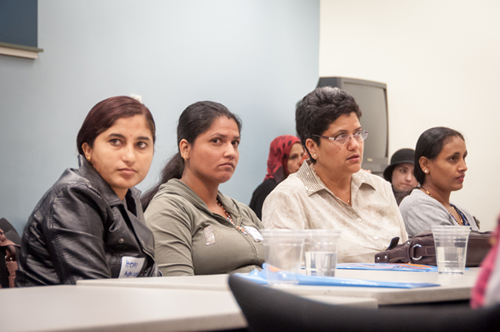By Laura Ohata
Northwest Asian Weekly

Participants listen to a lecture at the Refugee Women’s Institute (Photo by Laura Ohata/NWAW)
All over the world, refugees flee their countries in fear of torture and death, often at the hands of governmental authorities. When they arrive in the United States life poses new challenges.
During an emergency, many refugees hesitate to call 911 because they lack English-language skills. Even as victims of crime, they may fear of working with the emergency personnel…especially if they are women.
“I was afraid to call,” says Hem Adhikara, a Bhutanese refugee, speaking through an interpreter. As the primary caregiver of her aging mother-in-law, she worried that she wouldn’t be able to get help in a crisis. “I didn’t know when or how to call. I didn’t know what facts I needed.”
To better serve the refugee population, the City of Seattle and the Seattle Police Department developed the Refugee Women’s Institute, an eight-week leadership-training program designed to build mutual trust and understanding between immigrant communities and law enforcement officers. “For community policing to succeed, officers need to practice genuine engagement with various communities,” says Seattle Police Chief Kathleen O’Toole. “This program offers a unique opportunity for Seattle police officers to listen to, mentor, and learn from refugee women who can be powerful voices for their families and communities.”
The first group of 20 refugees is currently going through the program, which pairs them up with female mentors from the Seattle Police Department. “I never talked to a police officer face-to-face,” says Kumti Timsinal, also of Bhutan. “We never would have dreamed of talking to the police. We feel really good that we got this once-in-a-lifetime chance,” says Timsinal with a smile.
On October 11th, participants in the program visited the 911 Call Center at the Seattle Police Department with their mentors. There, they learned that the 911 Call Center provides assistance in 150 languages from around the world. If someone doesn’t speak English, they call 911 and say, “Nepali,” “Chinese,” or “Hindi,” and the appropriate translator will process the emergency. Participants also learned how to recognize the signs of human trafficking, and how to get help for victims.

Refugees get to know Detective Merry O’Cleary (Photo by Laura Ohata/NWAW)
According to Seattle Police Detective Merry O’Cleery, her past interactions with refugees involved only emergency situations. “This time it was to get to know the women as individuals,” says O’Cleary. A detective and former member of the Hostage Negotiations Team, O’Cleary saw more than her fair share of grit on the streets. Yet, the Refugee Women’s Institute allows her to show her softer side. “Now, I feel comfortable going into the community. They have seen pictures of my cats, and I have seen pictures of their kids,” said O’Cleary. “This has been a starting point. This is our fourth week…I have their phone numbers, and they have mine. We are building an ongoing relationship with them and their families.”
If the aim of the Refugee Women’s Institute is to create positive relationships, then it is already beginning to work. “The officers have become very protective of their mentees,” said Sahar Fathi, Policy, Programs & Strategy Lead at the City of Seattle Office of Immigrant & Refugee Affairs. “Since the program began, one of the mentees became homeless,” says Sahal. “Two of the police mentors check in on her regularly to make sure that she is okay.” The program also teaches women how to access city subsidies available during difficult times. “Creative and effective programs like the Refugee Women’s Institute will only strengthen Seattle’s reputation as a leader in refugee and immigrant integration and create an environment that welcomes the participation and engagement of refugees and immigrants in all areas of civic life,” said Seattle Mayor Ed Murray.
The refugees and police officers laughed with one another. “You can’t help but open your heart to the courage and wisdom these women bring from their life experiences,” says Detective O’Cleary. “It is so extreme, what they went through. I lived in a foreign country as a child. What they went through, the fact that they still have this joy…It makes you step back and examine your own attitude and outlook about life.”
When participants complete the Refugee Women’s Institute program, they will share their knowledge and new-found friends with their communities, making it easier for police to help them in a time of need. (end)
Laura Ohata can be reached at info@nwasianweekly.com.



